
Sharjah 'Stranger Danger' Experiment: UAE Experts Stunned By False Sense Of Security In Children
Last updated: Thu 4 Jul 2024, 12:08 PM
The findings of a recent social experiment in Sharjah, which showed that more than 97 per cent of children will enter a stranger's van for a free ice cream, were 'astounding', according to a spokesperson for the organisation that conducted it.
"Although we suspected that the data would reflect the relaxed nature of living in such a safe society, we were still astounded that 97.3 per cent of children accepted a gift from a stranger and agreed to enter their vehicle," said Hanadi Al Yafei, Director of Sharjah's Child Safety Department (CSD) speaking to Khaleej Times. "Even though the UAE is regarded as one of the safest countries in the world, it is important to always take care and teach our children to be vigilant."
Stay up to date with the latest news. Follow KT on WhatsApp Channels.
Last week, in an experiment conducted by CSD at a Sharjah park, only one in 37 participants hesitated to accept a free ice cream from a stranger in exchange for entering his van . The other 36 kids readily accepted the stranger's offer.
Al Yafei said the experiment was an "eye-opener" to parents and guardians to make sure that children "learn about safely navigating situations involving strangers". Her comments were supported by Samina Khanyari, General Manager of Jumeirah International Nurseries, Early Childhood Centres (ECC).
Hanadi Al Yafei“Young children are inherently trusting and have difficulty distinguishing between safe and unsafe strangers due to their developing cognitive abilities,” she said.“This age group sees adults as authority figures, making them vulnerable to manipulation by strangers offering enticing rewards like ice cream. In the UAE, where community interactions are frequent and close-knit, children often feel secure in public settings, leading to a false sense of security."
Samina Khanyari 'Stranger danger' educationAccording to Al Yafei, the experiment is a“stark reminder” of how vulnerable children are.“The results demonstrate the need for parents and educators to take proactive measures to protect children and equip them with the necessary skills to identify and avoid potentially dangerous situations,” she said.“Parents and educators must prioritise teaching children about the importance of seeking permission and informing them about their activities and whereabouts.”
She said the aim of the study was to create awareness about the importance of instilling safety knowledge and good habits in children from a young age, especially when travelling outside the UAE.
A single father and partner of UAE-based company SunMoney Solar, Zoltan Rendes divides his time between Budapest and Dubai. He said one of his biggest priorities was to teach his 12-year-old son about danger.
Zoltan Rendes“We have addressed safety topics including stranger danger from a very early age with Oliver, so he could get used to the fact that a lot of times your safety mostly depends on you, not on external factors and conditions,” he said.“I spent a decade of my life in war zones and crisis territories so I have a very advanced skillset when it comes to safety or emergencies. As a daddy that makes me a bit overprotective of course, but I'm trying to keep this within healthy limits.”
Safe practicesSamina said there were many age-appropriate techniques to teach children about the concept of stranger danger.
“Parents and educators must use a combination of engaging activities, and consistent reinforcement of simple rules to teach children about safety,” she noted.“Interactive activities like role-playing scenarios, where children practice saying 'no' and seeking help from a trusted adult can be very effective.”
According to her storytelling sessions and age-appropriate books are also great tools to reinforce the concept of stranger danger.“Regular discussions and reminders about not accepting gifts or rides from people that they do not know are essential,” she said.
“Visual aids like posters and videos can help young children understand and remember safety rules. For example, using a stop light system (red for stop and green for go) can help children understand when it's safe to interact with someone.”
ALSO READ:
-
Sharjah: 97% kids would enter stranger's van for free ice cream, social experiment finds
-
Dubai: Teen added to WhatsApp group with inappropriate content, bullies; mum sounds warning

Legal Disclaimer:
MENAFN provides the
information “as is” without warranty of any kind. We do not accept
any responsibility or liability for the accuracy, content, images,
videos, licenses, completeness, legality, or reliability of the information
contained in this article. If you have any complaints or copyright
issues related to this article, kindly contact the provider above.


















Comments
No comment